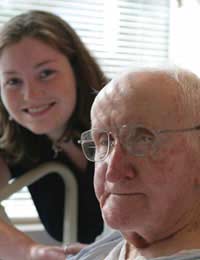Occupational Therapy Careers

If you think back to any difficulties you overcame, try to remember how wonderful you felt and think about the sense of achievement and confidence you experienced. You might be pleased to know that there is a career where you can help people to move beyond personal challenges. These challenges may be the result of a physical or mental health condition, an injury or they may be from age-related diseases and related problems. In an occupational health career, you would work with a range of people from many different backgrounds – helping them to live their lives to the fullest while reducing their reliance on outside physical support and help.
Learning About An Occupational Therapy Career
A day in the life of an occupational therapist is a busy one, where you would be working individually with clients to help them find ways to live independently, with respect to their unique lifestyle and health needs. For instance, you might work with a patient who is newly recovered from a stroke and must learn to perform daily care activities all over again due to loss of sensation and mobility. You might also look at how a work environment may be adapted to meet the needs of a worker who was recently injured in an accident. For a person with a mental illness such as depression, you might find ways to encourage activities and communication outside of the home. You may also communicate with housing associations to help a person find wheelchair accessible housing. In this way, you would be helping people to lead more normal and healthy lives, despite their challenges.After first meeting with a patient and assessing the patient's lifestyle, health conditions and concerns, you would look at ways to adapt their current ways of living to make daily tasks more manageable and effective. As your patient progresses, you would also modify the program to ensure it continues to meet the patient's needs. For clients with major challenges such as permanent disabilities, your ongoing work and support can make an enormous difference in the quality of their lives. Sadly, there are a number of conditions such as neurological ones that are degenerative, meaning the patient tends to become less able to live independently and comfortably as the disease progresses.
Choosing To Specialise In Occupational Therapy
One of the exciting aspects of occupational therapy is that you can eventually choose to specialise in a specific area. For example, you might works in hospitals and specialise in mental health disorders or perhaps you prefer to work with children, in which case you could specialise in paediatrics. Still others will choose to specialise in working with people who have suffered from cardiac arrest or require extensive rehabilitation following a stroke. While you may work with patients for only a session or two, more often than not you will provide a series of sessions or work long-term over years periodically to help patients as their conditions change and their treatment plan requires updating. In particular, some specialty areas of occupational therapy are long-term conditions such as a mental illness or autoimmune disorder that will need ongoing support and advice.Training To Become An Occupational Therapist
If you want to become an occupational therapist, you must take an accredited undergraduate degree program or a postgraduate course in occupational therapy. You would then need to register with the Health Professions Council (HPC). Those who are applying for postgraduate courses can increase their chances of acceptance onto the course by gaining valuable voluntary or paid work experience in health care, particularly in an assistant role within occupational health care units at hospitals or in a health care clinic.Coursework will include the life sciences as well as therapeutic ways to improve quality of life and independence. In addition, your training will include realistic and practical ways for patients to adapt to their health conditions, whether the condition is a changing or a temporary one. You will even study how environments can be modified to be more hospitable to a patient. One example would be a patient who suffers an accident that affects their back – an occupational therapist might suggest special seating in the office, which serves to support their needs.
The key areas of occupational therapy that you will study and experience in a practical placement are; learning disabilities, mental health conditions such as depression, social care services and also rehabilitation following physical injury or an illness. You will need to have well-developed communication skills, particularly given the regular interactions you will have with outside agencies such as housing associations or workplace management. Salaries typically start at around £19,700 to £25,500 per year but experienced occupational therapists can make approximately £37,500.








